 Chapter 4: Enhanced Emergency Preparedness
Chapter 4: Enhanced Emergency Preparedness
Here is a detailed breakdown of how SGSecure strengthens emergency preparedness in the workplace:
Comprehensive Emergency Response Training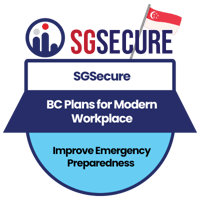
SGSecure emphasises the importance of training employees to handle emergencies confidently. This training is designed to align with the organisation’s BCP and includes:
- Terror Threat Responses: Employees are trained to react to situations such as active shooter incidents or bomb threats, following the principles of “Run, Hide, Tell.”
- Evacuation Procedures: Clear instructions on when and how to evacuate premises during emergencies, including fire drills and lockdown scenarios.
- First Aid and Life-Saving Skills: Basic training in CPR, using Automated External Defibrillators (AEDs), and handling injuries during crises.
Regular Drills and Simulations
SGSecure encourages organisations to conduct regular drills that simulate realistic emergency scenarios.
These exercises are essential for identifying gaps in preparedness and refining response strategies. Examples include:
- Active Shooter Drills: Testing the readiness of employees to respond to a hostile situation while maintaining personal safety.
- Suspicious Object Protocols: Training staff to recognise and report potential threats, such as unattended bags or packages.
- Cross-functional simulations: Collaborating with law enforcement, fire departments, and medical teams to test integrated response efforts.
Strengthened Crisis Communication Systems
Effective communication is a cornerstone of emergency preparedness.
SGSecure ensures organisations have robust systems in place to disseminate information quickly and accurately during a crisis:
- Emergency Alert Systems: Setting up mass notification platforms (SMS, emails, or mobile apps) to keep employees informed.
- Designated Crisis Spokesperson: Identifying and training a spokesperson to manage external communication and liaise with media or authorities.
- Pre-Prepared Templates: To reduce response time, develop templates for press releases, internal memos, and customer updates.
Scenario-Specific Contingency Planning
SGSecure provides tailored guidelines for preparing for scenarios that could disrupt business operations. For example:
- Terrorism-Related Disruptions: Guidelines for securing premises, screening visitors, and preventing unauthorised access during heightened threat levels.
- Pandemic Preparedness: Recommendations for hygiene practices, social distancing measures, and remote working arrangements.
- Cyber Threat Mitigation: Incorporating cybersecurity measures into emergency plans to counter data breaches or ransomware attacks.
Collaborative Efforts with Authorities
SGSecure promotes close collaboration between organisations and emergency services to enhance preparedness.
These partnerships provide:
- Customised Risk Assessments: Law enforcement and emergency services can help identify workplace-specific vulnerabilities and recommend mitigation strategies.
- Joint Exercises: Conducting drills that involve police, fire departments, and medical teams ensures seamless coordination during actual emergencies.
- Access to Resources: Organisations can leverage government-provided toolkits, guidelines, and intelligence to bolster their emergency plans.
Psychological Preparedness and Employee Support
SGSecure recognises the psychological impact of emergencies and emphasises the importance of readiness:
- Stress Management Training: Preparing employees to remain calm and focused during high-stress situations.
- Post-Incident Support: Providing counselling and support services to help employees recover from traumatic events.
- Leadership Training: Empowering managers and team leaders to guide their teams effectively during crises.
Technology and Innovation in Emergency Preparedness
SGSecure encourages the adoption of modern technologies to enhance preparedness, such as:
- Surveillance Systems: CCTV cameras and motion detectors will be installed to monitor potential threats.
- AI-Powered Threat Detection: Leveraging artificial intelligence to analyse suspicious behaviours or anomalies.
- Emergency Apps: Using mobile apps to send alerts, share instructions, and track employee safety during crises.
Real-World Applications of SGSecure in Emergency Preparedness
Incident 1: Active Shooter Simulation at a Business Park in Singapore
A large multinational company conducted a simulated active shooter drill with SGSecure and local law enforcement.
Employees were trained in lockdown procedures, evacuation routes, and crisis communication, significantly improving their readiness to handle such incidents.
Incident 2: Pandemic Preparedness in a Financial Institution
During the COVID-19 pandemic, a bank implemented SGSecure’s pandemic guidelines, which included health screenings, remote working setups, and enhanced hygiene protocols.
These measures ensured business continuity and employee safety.
Summing Up...
SGSecure’s focus on enhanced emergency preparedness equips organisations with the tools, knowledge, and systems to respond effectively to crises.
By integrating SGSecure principles with Business Continuity Planning, organisations can build a resilient workplace capable of navigating emergencies while safeguarding their people, operations, and reputation.
Disclaimer & Proper Usage of Guidebook
For details, please refer to Chapter 1, "SGSecure and Business Continuity: A Vital Partnership for Workplace Resilience."
SGSecure and Business Continuity Management |
||||
 |
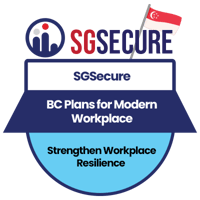 |
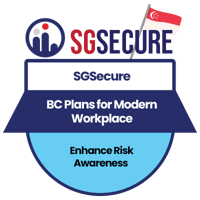 |
 |
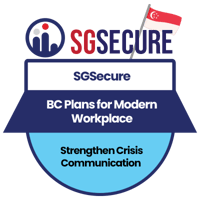 |
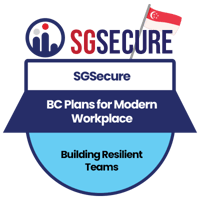 |
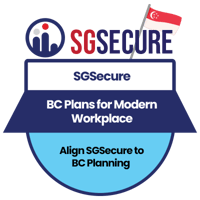 |
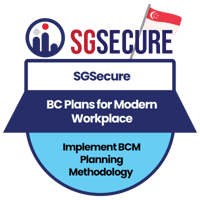 |
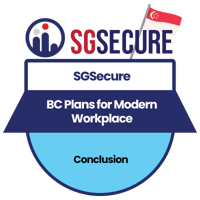 |
|
More Information About Business Continuity Management Courses

 To learn more about the course and schedule, click the buttons below for the BCM-300 Business Continuity Management Implementer [B-3] course and the BCM-5000 Business Continuity Management Expert Implementer [B-5].
To learn more about the course and schedule, click the buttons below for the BCM-300 Business Continuity Management Implementer [B-3] course and the BCM-5000 Business Continuity Management Expert Implementer [B-5].
![Register [BL-B-3]*](https://no-cache.hubspot.com/cta/default/3893111/ac6cf073-4cdd-4541-91ed-889f731d5076.png) |
 |
 |
 |
 |
 |
![FAQ [BL-B-3]](https://no-cache.hubspot.com/cta/default/3893111/b3824ba1-7aa1-4eb6-bef8-94f57121c5ae.png) |
If you have any questions, click to contact us.
|
 |
 |
 |
 |



![Email to Sales Team [BCM Institute]](https://no-cache.hubspot.com/cta/default/3893111/3c53daeb-2836-4843-b0e0-645baee2ab9e.png)

